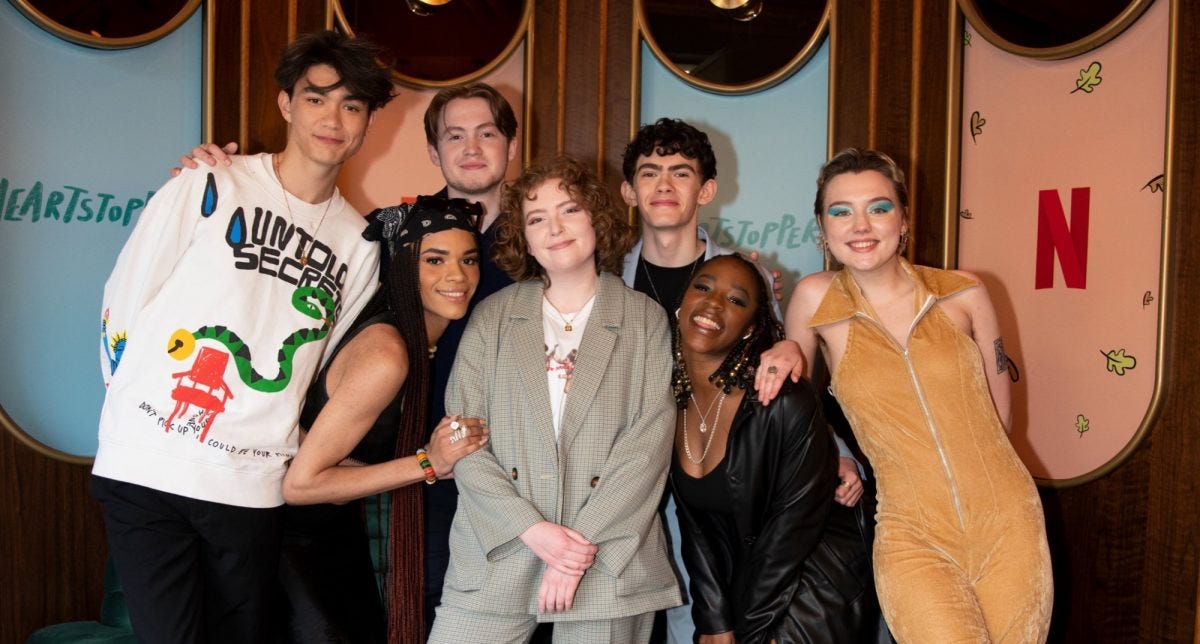'Heartstopper' Beats Loud!
How the teen show carves out a hopeful future for lesbian representation on TV.

Trigger warnings: this article briefly mentions conversion therapy, discusses the ‘bury your gays’ trope in moderate detail, and just generally discusses harmful depictions and attitudes towards lesbians in media.
One of the first pieces of lesbian media that I ever consumed came in the form of a bible-length Pitch Perfect fanfiction that was set in a conversion camp. Ten-year-old me would trek over to fanfiction.net night after night and learn about all the awful things that happen to queer people before I learned that I was one. Still, I swallowed it down hungrily and with the lights out because I already knew to be ashamed.
After that, I chewed up Pretty Little Liars and Glee and other TV shows that taught me about lesbians as self-loathing, lesbians as dead ornaments, lesbians as things to be picked apart, and investigated, etc. I also watched Queer as Folk and The L Word and grew up both too quickly and too slowly — I learned to live beyond the expectation of queer youth but was at the same time begging for it. Basically, the early to mid-2010s weren’t a great time to be super gay and incredibly lonely in the journey of figuring that out. As you might imagine (and might have experienced), it’s not the best thing when a character goes ‘Hey, I understand you sort of!’ and you respond with ‘Oh cool! How’s life for you?’ and they get shot and die.
So — dramatic tangent into my teen experiences with on-screen lesbianism aside — how does this circle back to Heartstopper, the TV adaptation of Alice Oseman’s acclaimed comic series about a group of LGBTQ+ teens adventuring through adolescence? Well. Tara (portrayed by Corinna Brown) and Darcy (played by Kizzy Edgell), two supporting characters in Heartstopper, might be the answer to that. They’re girlfriends. They’re figuring shit out. They’re in the school orchestra! They’re lesbians. And they love that.
When I discovered the Heartstopper comics a few years ago, I tore through what was already there at record speeds. Binge-watching the show has reminded me of one of the main things that lit a match in my heart and warmed my entire body up about Alice Oseman’s beautiful and compassionately crafted universe. Regardless of their struggles, these teenagers get to love and support themselves and their identities. It’s a fantasy, but it’s one that we need.
So, as I was watching Heartstopper with my wonderful girlfriend (who is hopefully reading this because I make her read everything that I write, so hi!) I was taken aback by a couple of details. Firstly, and arguably most importantly, Tara and Darcy both call themselves lesbians a LOT. This shouldn’t be groundbreaking or surprising for a modern coming-of-age show. And yet, I was blown away by the contentment with which two teenagers got to relate to their lesbian identity, considering that historically, the word itself has been treated as dirty and crude. Tara says it herself — she used to struggle to even say the word ‘lesbian’. Simply by framing the word ‘lesbian’ as something that can be joyful, light, and exciting, Heartstopper is doing what many teen shows refuse to do, even in today’s day and age. I can only think of a few examples of lesbian characters being so… happy with their identity within teen shows without having that happiness challenged or exploited for the sake of drama. In fact, I’m struggling to think of any examples off the top of my head of TV shows aimed at young people that depict characters using the word lesbian as freely and gleefully as Tara and Darcy do. Secondly, the fact that Tara discusses the experience of not being attracted to men is so important considering that, for a lot of us, that facet of lesbianism is the hardest to come to grips with. Finally, the fact that young queer people get to grow up watching Heartstopper – that queer joy is finally being presented as an OPTION… I could cry!
Heartstopper makes me hopeful. Hopeful that we are moving into a territory where lesbianism in media can be loud without being punished by death or silenced by writing-off beloved characters. I’m hopeful that other TV shows will start making notes and that writers will no longer shy away from labelling their lesbian characters as such. I’m also hopeful that soon, we’ll get a similarly lovely, soft-spirited, gentle coming-of-age show where lesbians get the chance to be among the main characters. As much as I love Tara and Darcy, what I would love even more is for young lesbians — and for everyone! — to get to see themselves as more than a side character, that there is room for them to exist in their entirety.




